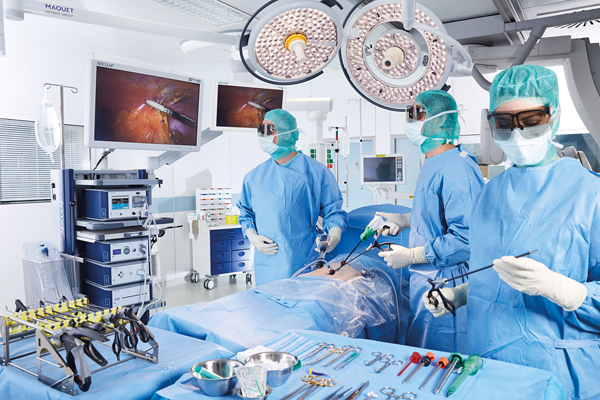Laparoscopy in Wroclaw
Search and Compare the Best Clinics and Doctors at the Lowest Prices for Laparoscopy in Wroclaw

Find the best clinics for Laparoscopy in Wroclaw
With Medijump you can browse 1 facilities offering Laparoscopy procedures in Wroclaw. The cheapest price available is $1,392 in Wroclaw. And for the cheapest price globally, prices start from $586 in Germany.
Laparoscopy in Poland
Price: $ 1,392
Laparoscopy in Wroclaw
Price: $ 1,392
Germany offers the best prices Worldwide
Price: $ 586
From 6 verified reviews
Ryan Clarke, 22 January 2022
I had gynecomastia surgery at Coramed recently and was extremely impressed by all aspects of my experience with Coramed. I contacted Anna and arranged the surgery and she was great at answering any questions I had. Aspects such as a hotel and a driver for my time in Poland were arranged for me which was a big help and saved time. Total all-in cost including flights, hotel, driver, tests, the surgery etc was about £2k. The actual clinic is incredibly modern and clean, I knew from reading other reviews that the clinic was very high standard but it was even better than I had expected to be honest. Ive experienced some NHS hospitals in the UK and Coramed was much cleaner and more modern. At the clinic, I met Anna as well as some other nurses over the course of my stay and all of them were so nice and professional. I had some doubts over whether I was making a good decision by travelling abroad for surgery in the days before I flew to Poland but after seeing the clinic and meeting the staff I felt at ease and had no nerves. Anna, the other nurses, the anaesthetist and the night nurse were all amazing and spoke good English. The surgery was performed by Dr Berendt who does gynecomastia surgery very often. I am 3 days post-op but already very happy with my results and glad I decided to get the surgery, he has done a good job. The pain was minimal and only really lasted for 1-2 days. I would definitely recommend Coramed, every aspect of the procedure was done to an extremely high standard and at a fraction of what I would have paid in the UK. I cannot imagine that UK surgeries are offering a service that justifies paying 4x more for the same procedure. I'm very happy I did my research and chose the team at Coramed.
WHY US?
At Medijump, we're making medical easy. You can search, compare, discuss, and book your medical all in one place. We open the door to the best medical providers worldwide, saving you time and energy along the way, and it's all for FREE, no hidden fees, and no price markups guaranteed. So what are you waiting for?

Free

Best Price

Widest Selection

Risk-Free
What you need to know about Laparoscopy in Wroclaw

Laparoscopy is a type of surgery that allows surgeons to access the inside of the abdomen and pelvis with only small incisions. Also known as minimally invasive or keyhole surgery, laparoscopy is less painful than traditional open surgery. Other benefits of this type of surgery include less bleeding, reduced scarring, and a faster recovery period.
What does a Laparoscopy Procedure Involve?
Laparoscopy is performed under general anesthetic. During the surgery, your surgeon makes small incisions in your abdomen to insert an instrument called a laparoscope, small surgical tools, as well as a tube to pump gas into the abdomen. A laparoscope is a small tube with a camera and a light attached to its end and the camera sends images of the inside of the abdomen to a monitor.
How Long Should I Stay in Wroclaw for a Laparoscopy Procedure?
You may be able to go back to your hotel immediately after a laparoscopy, but in some cases, you may need to stay for at least 1 to 2 days. You may be able to fly back home within 3 to 7 days after the surgery. During your stay, you will have to attend hospital check-ups and to rest.
What's the Recovery Time for Laparoscopy Procedures in Wroclaw?
The recovery period for laparoscopic surgery depends on the type of treatment. However, the overall recovery period is shorter than the traditional surgery. For example, the total recovery period for intestinal surgery with traditional methods may take 4 to 8 weeks, but with laparoscopic surgery, you only need 2 to 3 weeks to recover and return to work.
What sort of Aftercare is Required for Laparoscopy Procedures in Wroclaw?
The aftercare will be different from one person to another, depending on what type of condition the surgery is used for. Your surgeon will tell you how to keep your wounds clean, the diet you will need to follow, and the type of exercise you can do. You will likely have a follow-up check-up with your local doctor to monitor your condition.
What's the Success Rate of Laparoscopy Procedures in Wroclaw?
Laparoscopy is known to have a high success rate. Serious side effects, risks, and complications are rare. Minor complications occur in 1 out of every 100 cases, while serious complications occur in 1 out of every 1,000 cases. The side effects and risks include infection, minor bleeding, damage to an organ, or damage to a major artery.
Are there Alternatives to Laparoscopy Procedures in Wroclaw?
Laparoscopic surgery is an alternative to traditional open surgery. You can always undergo open surgery if you prefer to do so. There are also some treatment alternatives to laparoscopic surgery, but this depends on the condition you want to treat.
What Should You Expect Before and After the Procedure
Before a laparoscopy, you may have problems in your appendix, kidney, or other parts of your abdomen. After the surgery, these issues are treated and possibly resolved.
Whilst the information presented here has been accurately sourced and verified by a medical professional for its accuracy, it is still advised to consult with your doctor before pursuing a medical treatment at one of the listed medical providers
No Time?
Tell us what you're looking for and we'll reachout to the top clinics all at once
Enquire Now

Popular Procedures in Wroclaw
Prices Start From $520

Recommended Medical Centers in Wroclaw for Laparoscopy

- Interpreter services
- Translation service
- Religious facilities
- Medical records transfer
- Medical travel insurance
- Health insurance coordination
- TV in the room
- Safe in the room
- Phone in the room
- Private rooms for patients available

- Interpreter services
- Translation service
- Religious facilities
- Medical records transfer
- Medical travel insurance
- Health insurance coordination
- TV in the room
- Safe in the room
- Phone in the room
- Private rooms for patients available

- Interpreter services
- Translation service
- Religious facilities
- Medical records transfer
- Medical travel insurance
- Health insurance coordination
- TV in the room
- Safe in the room
- Phone in the room
- Private rooms for patients available

- Interpreter services
- Translation service
- Religious facilities
- Medical records transfer
- Medical travel insurance
- Health insurance coordination
- TV in the room
- Safe in the room
- Phone in the room
- Private rooms for patients available

- Interpreter services
- Translation service
- Religious facilities
- Medical records transfer
- Medical travel insurance
- Health insurance coordination
- TV in the room
- Safe in the room
- Phone in the room
- Private rooms for patients available

- Interpreter services
- Translation service
- Religious facilities
- Medical records transfer
- Medical travel insurance
- Health insurance coordination
- TV in the room
- Safe in the room
- Phone in the room
- Private rooms for patients available

- Interpreter services
- Translation service
- Religious facilities
- Medical records transfer
- Medical travel insurance
- Health insurance coordination
- TV in the room
- Safe in the room
- Phone in the room
- Private rooms for patients available

- Interpreter services
- Translation service
- Religious facilities
- Medical records transfer
- Medical travel insurance
- Health insurance coordination
- TV in the room
- Safe in the room
- Phone in the room
- Private rooms for patients available

- Interpreter services
- Translation service
- Religious facilities
- Medical records transfer
- Medical travel insurance
- Health insurance coordination
- TV in the room
- Safe in the room
- Phone in the room
- Private rooms for patients available

- Interpreter services
- Translation service
- Religious facilities
- Medical records transfer
- Medical travel insurance
- Health insurance coordination
- TV in the room
- Safe in the room
- Phone in the room
- Private rooms for patients available
Laparoscopy in and around Wroclaw
Popular Searches
- Plastic Surgery in Thailand
- Dental Implants in Thailand
- Hair Transplant in Thailand
- Breast Augmentation Thailand
- Gastric Sleeve in Thailand
- Gender Reassignment Surgery in Thailand
- Laser Hair Removal in Bangkok
- Botox in Bangkok
- Dermatology in Bangkok
- Breast Augmentation in Bangkok
- Coolsculpting in Bangkok
- Veneers in Turkey
- Hair Transplant in Turkey
- Rhinoplasty in Turkey
- Stem Cell Therapy in Mexico
- Rhinoplasty in Mexico
- Liposuction in Mexico
- Coolsculpting in Tijuana
- Rhinoplasty in Korea
- Scar Removal in Korea
- Gastric Sleeve in Turkey
- Bone Marrow Transplant in India
- Invisalign in Malaysia
- Plastic Surgery in the Dominican Republic
- Tummy Tuck in the Dominican Republic
- Plastic and Cosmetic Surgery in Poland
- Rhinoplasty in Poland
- Hair Implant in Poland
- Dental Implants in Poland
- IVF in Turkey
